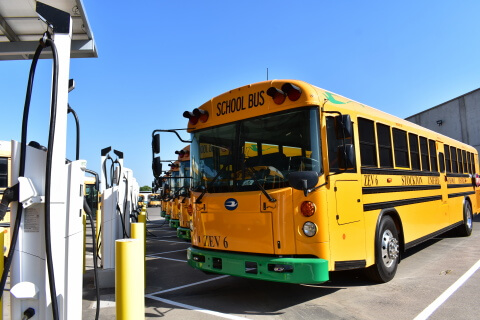Stockton Unified School District in Stockton, Calif., has partnered with The Mobility House, a company that integrates vehicle batteries into the power grid, to deploy smart charging strategy and management solutions for the district’s zero-emission fleet project, which is now operational and scheduled to transport students to schools throughout the district.
Completed in under one year, the electric school bus fleet project is part of a series of electrification initiatives the district adopted to transition its fleet to zero emissions. The transportation yard has been constructed for 24 chargers to accommodate future additions to the electric bus fleet and relies on The Mobility House to minimize electricity charging costs while also ensuring vehicles are readily available for assigned routes.
“Stockton Unified School District is proudly committed to pioneering sustainability efforts both within our local community and across California’s entire educational system,” says Gilbert Rosas, energy education specialist at Stockton Unified School District. “Removing diesel pollution from our operations sets the foundation for ultimately eliminating harmful toxins in the air for our children. We are also excited to use our electric buses and charging technologies in peer-led educational programs to teach students and faculty about the power of clean energy.”
Phase one of the project consists of 11 electric school buses, four of which were funded by the California Air Resources Board (CARB), two by the California Energy Commission and an additional five by San Joaquin Valley Air Pollution Control District. Funding of $4.94 million for this project was provided to Stockton Unified School District by California Climate Investments, a statewide initiative that puts billions of cap-and-trade dollars to work reducing greenhouse gas emissions, strengthening the economy and improving public health – particularly in disadvantaged communities.
Stockton Unified School District collaborated with the Center for Transportation and the Environment (CTE), Schneider Electric, Sage Energy Consulting and The Mobility House to develop a comprehensive roadmap for achieving net-zero emissions. The plan also details the installation of solar PV canopies as well as switching to all-electric lawn mowers, grounds maintenance equipment and fleet maintenance vehicles.
Make-ready infrastructure from Pacific Gas & Electric (PG&E) also qualified the district to participate in PG&E’s business electric vehicle (BEV) rate. Stockton Unified School District will benefit from lowest cost electricity and a charging capacity that allows the buses to operate well beyond the longest daily routes – saving the district a projected $500,000 over five years in charging costs.





